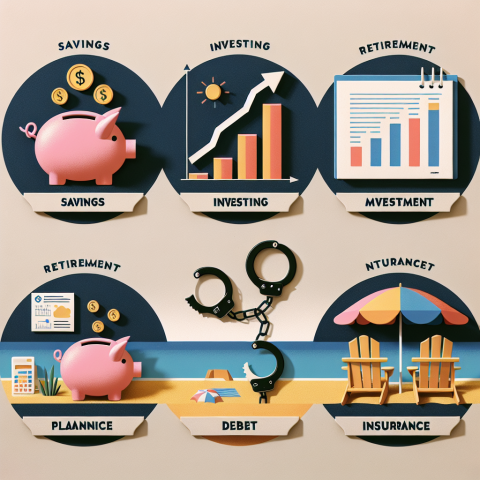Personal Finance – When it comes to personal finance, it can sometimes feel like there’s an endless stream of advice, tips, and strategies. But let’s be real—figuring out how to manage money wisely, especially with the world changing so quickly, isn’t easy. I’ve definitely made my fair share of mistakes along the way, but looking back, I can say that mastering a few core areas of personal finance has made a world of difference in my financial security. So, if you’re thinking about securing your future financially, here are the five key types of personal finance you should focus on.

5 Key Types of Personal Finance for a Secure Future
1. Budgeting: The Foundation of Everything
If I had to pick one thing I wish I’d understood better earlier on in my financial journey, it would be budgeting. You might hear it over and over, but let me tell you, it’s not just about tracking your spending. It’s about understanding where your money goes, what you value, and how to make sure you’re not living paycheck to paycheck.
I used to think that budgeting was only for people who had a lot of bills or debts, but that couldn’t be further from the truth. A well-structured budget helps everyone, whether you’re saving for a vacation or trying to pay down credit card debt. What helped me the most was using a simple system of tracking income versus expenses. It doesn’t have to be fancy—apps like Mint or even just a good old Excel spreadsheet can do wonders.
Practical Tip: When budgeting, categorize your expenses (e.g., essentials, discretionary spending, savings). This way, you can see exactly where you can cut back without feeling like you’re depriving yourself. I personally found that I was spending way more on eating out than I realized—cutting that down made a huge difference!
2. Emergency Fund: A Safety Net for Life’s Curveballs
It’s not glamorous, but having an emergency fund is one of the most powerful things you can do for your financial future. I didn’t really get the importance of this until one day my car broke down—of course, I didn’t have enough saved up to cover it, and I ended up taking on some high-interest debt to fix it. It was a nightmare.
Fast forward a couple of years, and I finally built a small emergency fund of three to six months’ worth of living expenses. Honestly, knowing that I’ve got a financial cushion in place for unexpected expenses (job loss, medical bills, etc.) has brought me so much peace of mind. It might feel like a slow process, but trust me—having that safety net gives you confidence to take risks and makes life’s curveballs a bit easier to handle.
Practical Tip: Start small. Even if it’s just $100 a month, begin putting money away for emergencies. It doesn’t have to be perfect—just start! If you’re struggling with where to even begin, try saving 1% of your paycheck and then slowly increase it as you get comfortable.
3. Retirement Savings: It’s Never Too Early to Start
Here’s a wake-up call: the earlier you start saving for retirement, the better. I know, I know—when you’re younger, retirement feels like something that’s a million years away. But the earlier you begin, the more you’ll benefit from compound interest, which is essentially the magic that makes your money work for you.
The first time I opened a 401(k) account, I wasn’t sure what to put into it, but I at least made sure I contributed enough to get my employer’s matching funds. Over time, I increased my contributions, and it’s been one of the best financial moves I’ve made. If you’re in a job that offers a retirement plan, take advantage of it. If not, open an IRA (Individual Retirement Account)—you’ll be thanking yourself down the line.
Practical Tip: If your employer offers a match on your 401(k), make sure you contribute enough to get the full match. That’s free money, and you don’t want to leave it on the table. And if you’re self-employed or your employer doesn’t offer a plan, consider setting up an IRA on your own.
4. Debt Management: Tackling What You Owe
It’s no secret that debt is a huge issue for many people. Whether it’s credit card debt, student loans, or car loans, carrying debt around can feel like a weight on your shoulders. When I was in my early 20s, I didn’t really pay attention to my credit card bills, and it spiraled out of control pretty quickly.
Learning how to manage and pay off debt was a game-changer for me. The biggest tip I can give here is to focus on the high-interest debt first (usually credit cards) and pay those off before tackling other types of debt. The debt snowball method works for some, where you pay off smaller debts first to build momentum, while the debt avalanche method focuses on the highest interest rates.
Practical Tip: Set up automatic payments for your debts, if possible. This way, you’re not tempted to “forget” and end up with late fees. I also found that paying just a little extra each month toward my highest-interest debt helped me chip away at it faster, saving me a ton in the long run.
5. Investing: Growing Your Wealth Over Time
Okay, let’s talk about investing. It might sound intimidating if you’re new to it, but here’s the deal: investing is one of the most effective ways to build wealth over the long term. I used to be scared to invest, thinking I needed a ton of money to even get started. But once I dipped my toes into it and started reading about how stock markets, mutual funds, and ETFs work, I realized that even small, consistent investments can make a huge difference over time.
A couple of years ago, I started investing through an index fund, which is basically a way of spreading your investment across a bunch of different stocks. It’s less risky than picking individual stocks and a great way to get your feet wet. The goal isn’t to get rich quick but to steadily grow your money over time. And trust me, you’ll be amazed at how those small contributions add up.
Practical Tip: Don’t try to time the market—consistency is key. Dollar-cost averaging, where you invest a fixed amount regularly (no matter what the market is doing), helps you avoid the stress of trying to pick the “perfect time” to invest.
Wrapping Up: A Holistic Approach to Financial Security
So, there you have it—the five key types of personal finance that I believe are essential for a secure financial future. Budgeting, building an emergency fund, saving for retirement, managing debt, and investing might seem like a lot to juggle, but once you start making them part of your routine, it gets easier. Take it step by step, and don’t stress if it feels overwhelming at first. You don’t have to be perfect, but as long as you’re making progress, you’re on the right track.
The most important thing I’ve learned is that financial security is a long-term game. It’s not about quick fixes; it’s about creating solid habits that will pay off down the road. So, take control, stay disciplined, and before you know it, you’ll be looking at a much brighter financial future.




